Proper nutrition for weight loss begins to interest us the moment we understand that dieting does not help. Diets don't help - it's a fact. Why? The answer lies in the prohibitions and restrictions that abound in both modern and well-known "proven over the years" diets. Proper diet for weight loss should be varied, healthy, and nutritious, no matter how strange it may sound. There are several basic principles of such a diet. And also loads of misunderstandings, misjudgments, stories of fantastic superfoods, blacklists of "harmful foods", and stories of their wonderful rehabilitation.

Before starting a conversation about nutrition, you need to understand that the balance of basic nutrients - proteins, fats, and carbohydrates - has shifted a lot towards the carbohydrate component in the past few years, specifically the last 25-30 years. At the same time, you don't have to try too hard and calculate - just go to a store and look at the shop windows with sweets. They take up almost a quarter of the retail space! And the first step in switching to a proper weight loss diet is to completely eliminate sugar in your daily diet. Sounds scary, doesn't it? Do you know why? Because sugar addiction is related to drug addiction.
- Well it started. . . - someone will say, disappointed, - Again bans and restrictions!
A few minutes of your attention and you will agree that cutting off sugar can be a huge breakthrough in improving the health of your body and, as a result, losing weight.
We need carbohydrates, of course. But which? We've all heard of fast and slow carbohydrates. We need slow ones. Dishes made from cereals, whole wheat flour, vegetables. . . Fruits and berries are full of faster carbohydrates, but eating fruits and berries is better than buying candy from pastry shops. Many nutritionists propose to resolutely and abruptly give up carbohydrates of any kind and reduce their consumption to 20-50 g per day. Such a sharp transition from the usual to the useful can lead to dizziness, loss of energy, a bad mood, and a belief that it is not that useful and that it is the right diet.
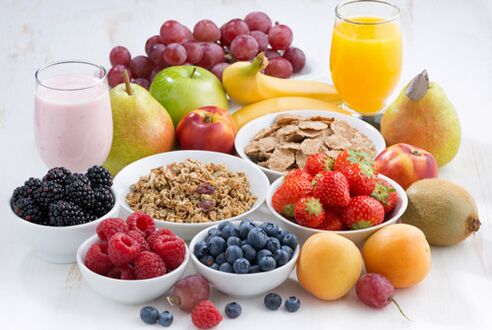
Proper diet for weight loss will bring much more benefit and joy if you gradually and consistently convert to it and not go astray. But first you need to understand why our bodies are so stubbornly resisting any change, especially a decrease in the amount of sugar.
Sugar is really the scourge of our time. Only a few products that are offered to us in supermarkets are missing a teaspoon of sugar. We're not talking about candy right now! Juices, yoghurts, marinades, sauces, semi-finished meat products, sausage and sausage products, canned fish, instant soups, instant noodles. . . The list is almost endless! All the more terrible the imminent transition to new nutritional principles - it turns out that we have almost nothing to eat !? Don't panic, there is a way out and it's pretty peaceful.
Proper diet for weight loss starts with three steps.
Step one:Remove sugar in its pure form. Tea, coffee, compotes without sugar. We reject jams, jams, sweets, chocolates, biscuits and other joys of drinking tea with friends or during a break from work. Ice cream, cakes, even low-calorie marshmallows will be excommunicated from our table! All carbonated drinks are prohibited. Try to avoid sugar for two weeks, just two weeks - you will be surprised. Tea tastes different. Coffee too. Cocoa with milk, but without sugar, charges better than any other luxury food. And what should be served with tea? At this stage nuts (not salted), dried fruits, energy mixes with honey (a mixture of nuts and dried fruits, passed through a meat grinder, you can add lemon), sandwiches with butter (yes, yes! ), Cheese and regular sausage, and betterwith homemade boiled pork, with caviar, lightly salted salmon, etc. At the same time, tea with all these delicacies should be part of breakfast, lunch or dinner and not be an ordinary snack. About snacks, however, a little later.
Step two:When the body switches from fast to slow carbohydrates, it's time to eliminate foods with a high glycemic index: good quality wheat flour, white rice, and potatoes. This means that all rolls, breads, pies, porridge made from peeled rice, semolina porridge, as well as everyone's favorite Manna cake and potatoes in all variations are automatically transformed from everyday food into a delicacy. Yes, and soups can now do without potatoes. At the same time, rye bread and baked goods made from whole grain flour (no sugar, have you forgotten? ), Buckwheat steamed or simply poured over night with clear water, instant oat flakes, they can be mixed very well with fermented milk products, as well as all exotic or forgotten cereals such as spelled, quinoa. In addition, frankly, you need to remove sweet fruits from the diet - bananas, grapes, pears. Berries are not on this list due to their high acidity.
Step three:At this point, you should cut out all carbohydrates and leave only natural carbohydrates that are part of vegetables and sour berries. However, sometimes the first two steps are enough to significantly reduce weight. And if you meet a few more conditions at the same time, you don't have to look around for a new diet yourself - you get to a whole new level where the right diet comes first, and that for a lifetime.
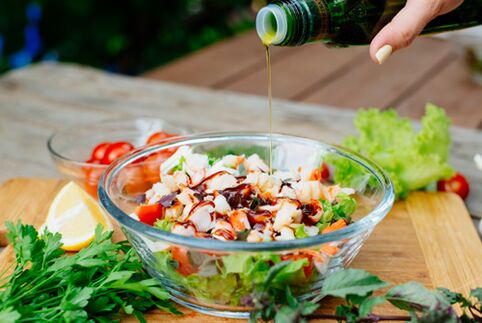
The right diet for weight loss should be varied.This means that in addition to the notorious BJU (proteins, fats and carbohydrates), the balance should also contain vitamins and trace elements. And when carbohydrates provide us with energy in a pure, accessible form, it is much more difficult for the body to get that energy from proteins and even more from fats. But, as is often the case, what is hard to come by is usually the most useful. Calories from carbohydrates are usually excessive, our body hardly tries to process them, which is why "sugar calories" fit so quickly into cozy fat rolls.
Proteins are vital to our body.Protein is important for a lifetime: in childhood it is a building material, in adulthood it is an element that helps our body to function as long as possible and to maintain itself optimally. See for yourself: protein has a protective function, helps in the production of antibodies, transport, the most famous protein hemoglobin supplies every cell with oxygen, regulating - without protein normal hormone production is not possible, motor - all types of movement are controlled by the proteins myosin andActin, plastic - the collagen protein is responsible for the condition of the connective tissue, the appearance of the skin, etc. , Energy - proteins provide the body with energy. But perhaps one of the most important functions of a protein is the maintenance and transmission of genetic information. It is believed that the increasingly prevalent horrific disease "Alzheimer's disease" is directly related to inadequate protein intake (not only with it, but the second most important component slightly lower).
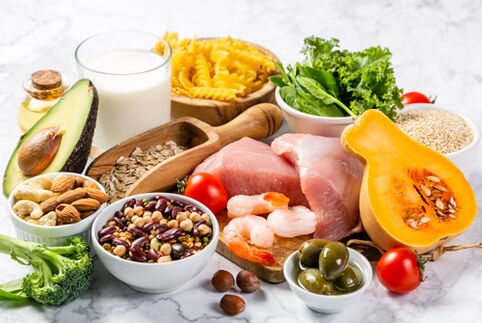
How Much Protein Does the Average Adult Need? Many nutritionists, doctors and proponents of proper nutrition adhere to the norms for protein intake, which was derived by the German scientist Max Rubner more than a hundred years ago, which amounted to 0. 33 g of protein per 1 kg of body weight. Much has changed since then, science has advanced, and recent studies have found a very average value of 1. 2-2. 0 g per 1 kg of weight. An impressive difference. In addition, these 1. 2-2. 0 g are not the weight of the product, for example a piece of meat or a portion of beans, but the content of pure protein in the product. An example table for high protein foods can be found on our website. Our website has written more than once about the benefits of protein products, but it never hurts to repeat these general truths.
Despite the huge popularity of vegan, raw, and vegetarian diets, we still need at least 50% animal protein to keep the body healthy and non-viable. These are eggs, dairy products, fish and seafood, meat and offal. It is these proteins that, unlike plant foods, have a full set of amino acids. Although they must be eaten, if only because variety is the essence of proper nutrition!
It is clear that there are only a few products on our planet that are made from a single substance. Almost every food is a combination of proteins, carbohydrates and fats. And here with the last ingredient - the fats - the perhaps greatest crime story in the history of nutritional science happened. In one "perfect" moment, fats were declared enemies of health. Everyone has heard horror stories of cholesterol, plaques in blood vessels, and other horrors. And when you look at how stores are replenishing their assortments with low-fat or completely low-fat products at an enviable rate, you doubt the sincere desire to feed us "right", "healthy", "alive" because there is nothing right anduseful when there is no fat in the diet.
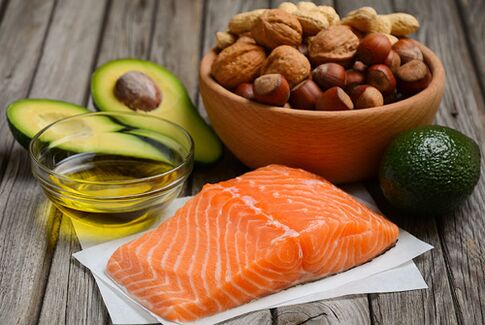
What is the function of fats in our body? They will say - help with the absorption of fat-soluble vitamins. And all? From biology classsomeone from school will still remember the heat exchange function of fats. The most important function of fats in the body is the surfactant metabolism, in other words, to put it simply, to ensure the exchange of oxygen in the alveoli. Fat lines the walls of the alveoli in a thinnest layer and enables us to breathe and. . . to live. My grandmother's methods of treating lung diseases immediately come to mind: badger fat, dog fat, goose fat, hot milk and butter - there is fat everywhere, inside and out, and it helped! And by the way, it still helps, only drugs to treat hypoxia (lack of oxygen), which are now being sold for wild money, actually constitute a fat emulsion. Another important function of fats is the synthesis of membranes. The cell membrane consists of 70-85% fats, and the function of the membrane is to ensure the protection of the cells, their thermal insulation and selective permeability (since not everything that tries to enter the cell is useful and necessary for this). The myelin layer, the insulating covering of our nerves, consists of 70-80% saturated fatty acids. No myelin - got Alzheimer's, senile (pretty much younger) sclerosis, and dementia. Fat is one of the most important substances that are essential for the construction of membranes, the myelin sheath, their function and the function of the central and peripheral nervous system. Keep this in mind if you choose between 0. 5% and 3. 2% milk.
Another important function of fats is hormonal. Fats are sources of hormone synthesis and there are many in our bodies. These are growth hormones, protein hormones, thyroid hormones, digestive system hormones, steroid hormones, adrenal hormones, sex hormones, etc. It is clear that the slightest prejudice, the underproduction of a hormone, threatens major disruptions in the work of the whole organism. A sudden attack of blackheads and acne, all types of rashes are a sign of low androgen levels. Frequent headaches "for no reason" can be a sign of low estrogen levels. Constant insomnia - not enough progesterone. Tiredness, exhaustion, and even exhaustion even at rest can be a sign of a disruption in thyroid hormone production. Hair loss is also a sign of this disorderWeight gain may be due to high levels of the hormones estrogen, cortisol and insulin combined with low testosterone levels. Forgetfulness and distraction are indicators of low levels of estrogen and cortisol. How Everything Is Connected!
Fats are responsible for regulating heat. This is why men who don't diet are often hotter than women who are constantly losing weight. Constantly freezing hands and feet are most likely a sign of a lack of fat, unless it is a congenital characteristic. The most famous function of fats is the dissolution and absorption of fat-soluble vitamins: A, E, D, K. Sitting on a low-fat diet and drinking vitamin complexes - not an option, vitamins simply are not absorbed.
And last but not least - vitamins, minerals, macro and micro elements. These substances occur in all products in different amounts and combinations, but special attention should be paid to fresh vegetables, roots, fruits and berries. One of the most valuable vitamins - vitamin C - is not synthesized in our body and can only be obtained from fresh plant products. Our site has a whole section on vitamins, read it, it's useful! Plant foods contain enzymes and flavonoids, all kinds of minerals without which we simply cannot function normally. For example, potassium - the work of the heart will be disrupted without it. Magnesium is responsible for the health of the brain, the nervous and endocrine systems and is involved in metabolic processes. There is also dietary fiber in herbal products - without it, digestive and peristalsis processes are almost impossible!
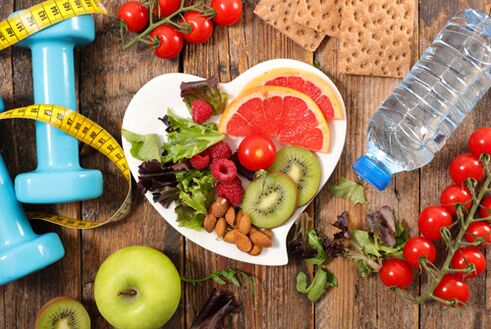
Proper nutrition for losing weight and improving the body includes the following principles:
Do not eat more than three times a day. Unexpected, right? But what about 5-6 meals a day that are advertised in many recommendations? Such part meals are perfect for children, athletes and seriously ill citizens. If you don't belong to any of these categories, eat three or even twice a day.
Only eat when you are hungry, not at night. Breakfast is optional! If you don't feel like eating in the morning, reschedule breakfast a few hours later. Don't pack food just because someone said breakfast is the most important thing.
Learn to listen to yourself and understand the difference between hunger and the usual habit of mixing things up. The following recommendation will help.
Drinking water. Not in liters, as is sometimes recommended. Not cooked. Ideally bottled or spring. The drinking cure is easy to embarrass: 2 glasses of lukewarm (not cold and no boiling water) in the morning, 1-2 glasses during the day and 1 in the evening. Sometimes it is enough to drink water to understand that it was just thirst, not hunger.
Get in the habit of buying all kinds of nuts and seeds more frequently. In addition to fats, they contain a large amount of macro and micro elements.
Eat whole foods. That is, not fat-free! Cottage cheese - 9% fat, not less, but with sour cream, coffee with cream, sandwiches, fatty cheese, fatty sea fish, exotic avocado, bacon! This is not your typical fire-to-fire slant. Of course, everything needs a measure.
Don't forget proteins! But what is no less important is what it is combined with. And this recommendation will be the last.
Eat vegetables. Lots of vegetables and herbs. Fresh, pickled, pickled, steamed, boiled and even fried in oil! But fresh salads are of course preferable. It is not difficult to calculate the amount of vegetables: mentally divide your plate in two - half will be topped with vegetables and the second will be filled with proteins, fats and the same allowable minimum of carbohydrates.
Proper diet for weight loss is not strict tables and recipes. This is a conscious approach. All of these tips only work when there is an almost complete rejection of carbohydrates. If you combine proteins with carbohydrates (mashed potatoes with schnitzel) or fats with carbohydrates (bacon with bread) in one plate, you are done. More precisely, no, of course you will not die immediately. They will just go on living, sighing at doom over every new kilogram and complaining about injustice ("I am literally sitting on the same water, where does the fat come from??? "). No sitting on the water, no need to deal with hungerand diet products. Just start with three steps and move on to health and beauty without turning around.













































































